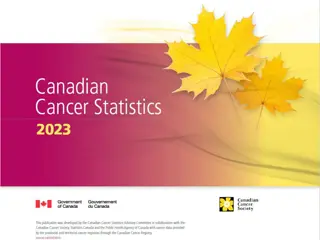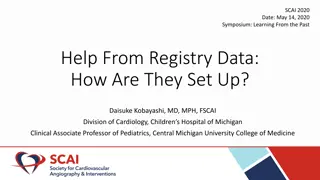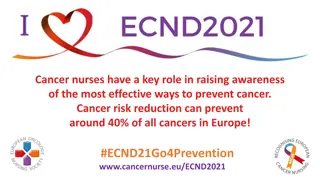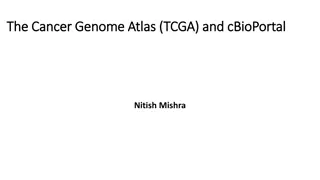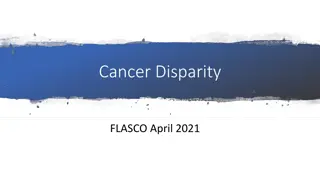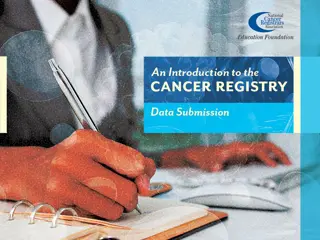Understanding Cancer Registries and Their Significance
Cancer registries serve as vital information systems for collecting, storing, and analyzing cancer data to aid in research, prevention, treatment, and public health efforts. They help track cancer incidence, assist in identifying trends, and provide essential information to healthcare professionals and policymakers in the fight against this prevalent disease. The role of cancer registrars is crucial in ensuring accurate data collection and reporting. Dr. Donna Shalala emphasizes the importance of national cancer registries in enhancing our understanding of the disease and optimizing resource allocation for effective prevention and treatment strategies.
Download Presentation

Please find below an Image/Link to download the presentation.
The content on the website is provided AS IS for your information and personal use only. It may not be sold, licensed, or shared on other websites without obtaining consent from the author. Download presentation by click this link. If you encounter any issues during the download, it is possible that the publisher has removed the file from their server.
E N D
Presentation Transcript
Objectives Define what a cancer registry is Discuss the purpose of the cancer registry Explain the importance of the cancer registry Define what a cancer registrar is Identify the responsibilities of a cancer registrar Describe different types of cancer registries
Dr. Donna Shalala stated: A national system of cancer registries can help us understand the disease better and use our resources to the best effect in prevention and treatment.
Cancer Registry Definition An information system designed for cancer data collection storage management analysis A type of disease registry
Purpose of the Cancer Registry Establish and maintain a cancer incidence reporting system Serve as an information resource for cancer research Provide information to assist public health officials and agencies
The Cancer Registration Process A continual, systematic collection of data on the occurrence and characteristics of reportable malignancies and tumors. Helps assess and control the impact of cancer on a community.
Importance of the Cancer Registry Cancer is a major national burden Cancer is the second leading cause of death among Americans, only second to heart disease Estimated direct costs of cancer care in the US in 2015 were $80.2 billion Source: https://www.cancer.org/content/dam/cancer-org/research/cancer-facts-and- statistics/annual-cancer-facts-and-figures/2018/cancer-facts-and-figures-2018.pdf
Importance of the Cancer Registry Physicians need cancer data to Learn more about causes of cancer Detect cancer earlier Increase the chance to find a cure Cancer specialists need cancer data to Make treatment decisions Determine if treatment worked If not, determine why
Importance of the Cancer Registry Data helps pinpoint environmental risk factors or high-risk behaviors Tobacco is the world's most preventable cause of death Smoking causes one third of all cancer deaths 80% of lung cancer deaths attributed to tobacco use Preventive measures to reduce the number of cancer cases and death Source: https://www.cancer.org/research/cancer-facts-statistics/all-cancer-facts-figures/cancer-facts-figures- 2018.html
Importance of the Cancer Registry Local/state/national cancer agencies and cancer control programs make important public health decisions Maximize effectiveness of limited public health funds Implementation of screening and prevention programs
Importance of the Cancer Registry Lifetime follow-up (patient contact) Reminder to physicians and patients Provides accurate survival information Source: https://www.cancer.org/research/cancer-facts-statistics/all-cancer-facts-figures/cancer-facts-figures-2018.html
Cancer Registrars The data management experts behind the collection system Trained to collect accurate, complete, and timely data on cancer patients, including lifetime follow-up Case abstraction
Responsibilities of Cancer Registrars Data management experts on all cancers Collect timely, accurate, and complete data Summarize patient s disease, from diagnosis to death (abstract) Submit data to their State Registry and the National Cancer Database Ensure compliance of reporting standards Compile statistical reports Organize and participate in Cancer Conference
Types of Cancer Registries Hospital registries Incidence-based State registries Population-based Special cancer registries Gilda Radner Familial Ovarian Cancer Registry National Cancer Database (NCDB)
Types of Cancer Registries Hospital-based registry goals Improvement of patient care Professional education Administrative information Clinical research Monitor site specific treatment measures
Types of Cancer Registries Population-based (state) registry goals Cancer prevention Early detection Determine cancer rates and trends Assess patterns of care and outcomes Research Evaluation of control efforts
Summary Purpose Collect accurate, complete cancer data Importance of data Cancer control Epidemiological research Public health program planning Patient care quality and improvement
Thank You NCRA Education Foundation www.ncraeducationfoundation.org NCRA www.ncra-usa.org





